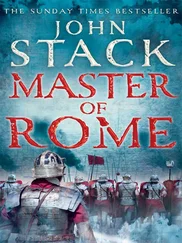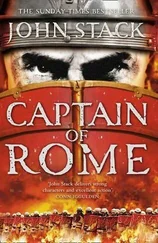The year before he had fought at the Battle of Agrigentum, the first pitched battle against the Carthaginians, the Punici, on the island of Sicily. As a member of the principes , the best fighting men of the legion, he had been positioned in one of the centre maniples of the second line of the three-line, triplex acies, formation. He was an optio , second-in-command to his centurion, and, after the first line of hastati had been overwhelmed by the Carthaginians, he had helped steady the line before the Romans turned the tide of battle and broke the Carthaginian front. His actions that day had come to the attention of the commander, Lucius Postumius Megellus, and he had been rewarded with promotion to the rank of centurion.
‘Alone, of course,’ he thought to himself with a smile, as he watched the legionary return from the foredeck of the trireme through the dissipating fog. He had known that Atticus would not come to him. Before being assigned to the Aquila , Septimus had had no respect for sailors. His first experience at sea had been only four years earlier, when the Roman task force of four legions, some forty thousand men, were ferried in barges across the Strait of Messina to Sicily to counter the Carthaginian threat to that island. It was the first time the Roman legions had deployed off the mainland, but the sea trip had only been one link in a chain that saw the legions travel from their respective camps around Rome to the battlefields of Sicily. In his eyes, the sailors had been no different from the myriad of support people who serviced the fighting men of the legions, and their ships were unwieldy, uncomfortable hulks.
The Aquila , however, was a different breed of ship. Powered by both sail and the strength of two hundred slaves, she was capable of incredible speed and manoeuvrability, a stallion in comparison to the pack mules that were the transport barges he had first encountered. Atticus was the perfect foil for the Aquila. Completely at home on the deck of his ship, he had an innate ability to get the best out of both his crew and his ship. Septimus’s respect for sailors was born out of his respect for Atticus. On the two previous occasions the Aquila had gone into action since Septimus had been assigned to her, the captain had proved himself to be the equal of any centurion.
Septimus noticed that the legionary was treading softly on the timber deck, and when he saluted it was not with the usual vigour.
‘Well, soldier, where is he?’ Septimus asked with underlying menace.
The legionary hesitated. ‘The captain said he can’t leave the foredeck.’
In the silence that followed, the soldier waited for the rebuke that was sure to follow, bracing himself. Septimus noticed his expression and smiled inwardly.
‘Very well,’ the centurion said tersely, ‘get back to your position.’
The legionary saluted again and with relief retook his position in the ranks.
‘Quintus,’ Septimus called over his shoulder, ‘take command. I’m going to see the captain.’
‘Yes, Centurion,’ the optio replied as he moved front and centre.
Septimus took off towards the foredeck, passing several of the ship’s crew as he went. They had been busy since dawn, preparing the ship for action, a routine drilled so well that all work was carried out without comment or command. He approached the captain slowly.
Atticus stood at the very front of the foredeck, leaning slightly over the rail as if to extend his reach through the impenetrable fog. He cocked his head slightly as he picked up Septimus’s approach, but did not turn. Atticus was three inches shorter, thirty pounds lighter, and a year older than the centurion. Of Greek ancestry, he was born the son of a fisherman near the city of Locri, a once-Greek city-state of Magna Graecia, ‘Greater Greece’, on the toe of Italy, which Rome had conquered a generation before. Atticus had joined the Roman navy at the age of fourteen, not out of loyalty to the Roman Republic, for he had never seen Rome and knew little of its democracy, but out of what he believed to be necessity. Like all those who lived on the shores of the Ionian Sea, his family feared the constant attacks of pirates along the Calabrian coast. Atticus had refused to live with this fear, and so he had dedicated his fifteen-yearlong career to hunting pirates, a hunt that he hoped would bear fruit once again that very day.
‘You wanted to speak to me?’ Atticus said without turning.
‘Yes, thanks for coming so quickly,’ Septimus said sarcastically. ‘Well, where are these pirates of yours? I thought they were expected over an hour ago.’
‘I don’t know where they are,’ Atticus replied frustratedly. ‘Our sources said their bireme passes this section of the coast every second day before dawn.’
‘Could your “sources” be wrong?’
‘No, the lives of those fishermen depend on knowing the movements of any pirates in these waters. They’re not wrong…but something is. That ship should have passed by now.’
‘Could you have missed them in the fog?’
‘Doubtful…a pirate bireme? If she passed within a half-league of here I’d have heard the drum master’s beat. No…she hasn’t passed.’
‘What if she were under sail?’
‘She can’t be under sail, not this close to the shore, especially with an intermittent onshore wind.’
Septimus sighed. ‘So what now?’
‘The fog is dissipating. We wait until it’s gone and we move out of this inlet. Without a man on that headland,’ he indicated the opening of the inlet, ‘we don’t have enough advance warning of any approach and we might be spotted in here. We can’t risk being bottled in.’
As if by Atticus’s command, a large gap in the fog opened around them. Septimus was turning to leave the foredeck when the sight off the bow arrested him. At this point on the Calabrian coast the Strait of Messina was over three miles across, and under the blue sky he could see the distant shore of eastern Sicily. However, it was not the magnificent vista opening before him that stopped him short.
‘Now we know why the pirate ship didn’t appear,’ muttered Atticus.
In mid-channel, a league away and directly across from them, three trireme galleys were slowly beating north towards the mouth of the strait. They were a vanguard, scouting ships, moving ponderously under oars in arrowhead formation, unable to utilize their sails in the calm weather of the strait.
‘By the gods,’ whispered Septimus, ‘who are they?’
‘Carthaginians! Tyrian design, heavier than the Aquila , rigged for sea crossing. Looks like the fog hid us for just long enough.’
Atticus’s gaze was not on these three ships as he spoke, however. He was looking further south along the strait. At a distance of over two leagues behind the vanguard, Atticus could see the darkened hulls of additional approaching ships, a whole fleet of them led by a quinquereme, a massive galley with three rows of oars like the Aquila but with the upper oars manned by two men each.
Septimus noticed Atticus’s gaze and followed its line, instantly spotting the other ships.
‘In Jupiter’s name,’ Septimus said in awe, ‘how many do you think there are?’
‘At least fifty,’ Atticus replied, his expression hard, calculating.
‘So what now?’ Septimus asked, deferring to the man who now controlled their next move.
There was a moment’s silence. Septimus tore his gaze from the approaching fleet and looked at Atticus.
‘Well?’
Atticus turned to look directly at the centurion.
‘Now we run.’
Hannibal Gisco, admiral of the Punic fleet and military commander of the Carthaginian forces in Sicily, was a prudent man. Ever since taking command of the Carthaginian invasion of Sicily over five years earlier, he had insisted that any significant fleet of galleys was to be preceded by a vanguard. This ensured that any dangers were detected long before the fleet proper stumbled upon them. The evening before he had transshipped from his flagship quinquereme, the Melqart , to the trireme assigned point duty for the coming day’s operations, the Elissar. They were on their way to Panormus on the northern Sicilian coast, where Gisco planned to deploy his forces back along the coast in an attempt to blockade the Sicilian ports now in Roman hands, thereby hampering their supply lines from the mainland. The captain of the galley had naturally given up his cabin for the admiral; although the cabin was comfortable, Gisco had slept fitfully, the anticipation of the coming day running through his mind. They were to pass through the mouth of the strait, where Sicily and the mainland were separated by only a league, a mere two thousand five hundred yards, and a natural route for Roman supplies. As the commander of the vanguard he planned on being one of the first to draw Roman blood that day.
Читать дальше
Конец ознакомительного отрывка
Купить книгу











